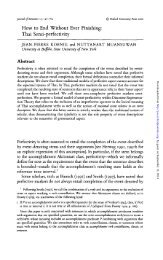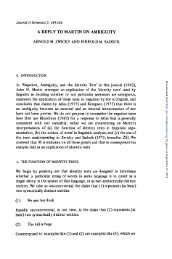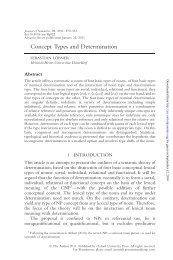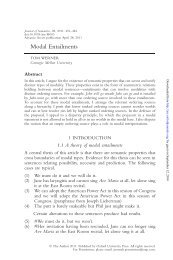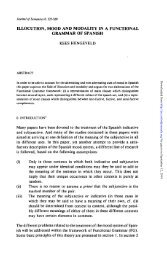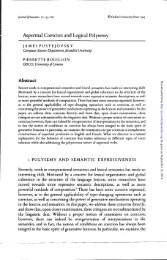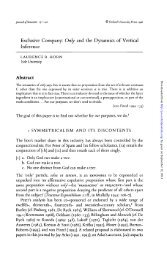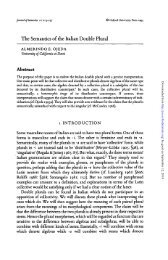Lexical Pragmatics - Journal of Semantics
Lexical Pragmatics - Journal of Semantics
Lexical Pragmatics - Journal of Semantics
You also want an ePaper? Increase the reach of your titles
YUMPU automatically turns print PDFs into web optimized ePapers that Google loves.
Reinhard Blutner 139implausible to assume that I have only one book or one finger. Only in theformer case can the more precise genitive form (/ slept on my book; I slept inmy car) block the corresponding interpretation. In treating the examples onthe right-hand side, we have to take into account also those interpretationswhere more than one book or one finger is involved; in this case there is noalternative expression that may block the ego-centred interpretations andthey may be selected by means <strong>of</strong> the I-principle.Summarizing, the present account <strong>of</strong> conversational implicature triesto give a real unification <strong>of</strong> the two competing 'forces' expressed by theQ-principle and the I-principle, respectively. This approach contrasts withmost recent theoretical accounts (e.g. Hirschberg 1991; Matsumoto 1995)that have focused on single classes <strong>of</strong> conversational implicatures only. Incontrast, the present account tries to address the integration <strong>of</strong> differentkinds <strong>of</strong> conversational implicatures.The main problems addressed in this paper are problems <strong>of</strong> <strong>Lexical</strong><strong>Pragmatics</strong>. Before I come to a detailed treatment <strong>of</strong> some typical examples,I want to discuss four theses that are designed to characterize <strong>Lexical</strong><strong>Pragmatics</strong> from a methodological point <strong>of</strong> view.3.2 Four theses <strong>of</strong> <strong>Lexical</strong> <strong>Pragmatics</strong><strong>Lexical</strong> <strong>Pragmatics</strong> is a research field that tries to give a systematic andexplanatory account <strong>of</strong> pragmatic phenomena that are intimately connectedwith the semantic underspecification <strong>of</strong> lexical items. The approachcombines a compositional semantics with a general mechanism <strong>of</strong> conversationalimplicature. Starting <strong>of</strong>f from a underspecified semanticrepresentation, a mechanism <strong>of</strong> information enrichment (abduction) isinvoked to yield the appropriate specification with regard to thecommon ground.In section 2 the range <strong>of</strong> <strong>Lexical</strong> <strong>Pragmatics</strong> has been characterized byseveral examples, and some general, typical problems have been discussed.The present subsection tries to sharpen the rather impressionistic picturethat has evolved and attempts to illuminate it from a methodologicalperspective.Downloaded from http://jos.oxfordjournals.org/ by guest on September 12, 2014Thesis i: <strong>Lexical</strong> <strong>Pragmatics</strong> is non-compositionalIn section 2 I argued against the principle <strong>of</strong> pragmatic compositionality. Thisprinciple says that it is possible to decompose the lexical items <strong>of</strong> ancompound expression into conceptual components which combinedtogether determine the conceptual interpretation <strong>of</strong> the whole expression.



